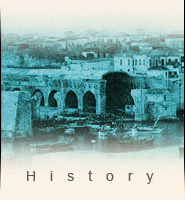
Linguistic Interaction
Up until the Haleppa Pact of 1878, Old Turkish (Ottoman Turkish written in Arabic script) was the official language of the bureaucracy, though Greek spoken in Cretan dialect was dominant in everyday life. Beyond the Christians, Greek speakers also included Cretan Muslims - indeed most of them had no knowledge of Turkish. In any event, one consequence of this bilingualism is the survival of Turkish-root words in Cretan dialect to this day, such as delikanis (delikanli = "mad blood" = boisterous youth).
Mutual linguistic influence is however most evident in family names. Many Turco-Cretans bore surnames of Greek or Cretan origin, such as Psychopedakis, Orfanakis, Hohlidis, Portokalakis and Ladakis. On the other hand, many Christian surnames had Turkish roots: Oustamanolakis (ousta = "master builder") Bitsaxakis (bicacki = "knife maker") Albantakis (nalbant = "farrier") Semertzakis (semerci = "saddler").
The New Gate, 1900 (G. Gerola)
1669
1669
1669
1669
1671
1681
1688
1691
1692
1715
1735
1735
1770
1771
1780
1810
1810
1812
1821
1822
1822
1823
1824
1825
1828
1830
1831
1833
1840
1841
1850
1856
1858
1858
1862
1862
1866
1866
1868
1869
1875
1878
1878
1881
1889
1895
1895
1897
1897
1898
1898
1898










